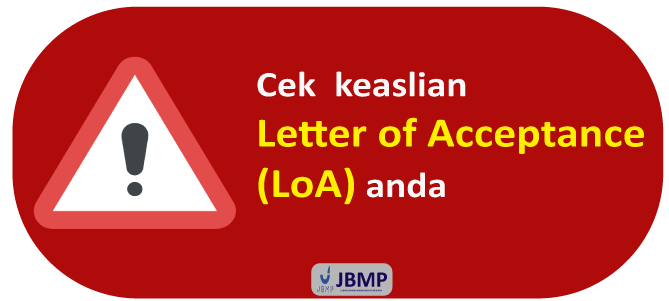Pengaruh Kemandirian Belajar dan Keterlibatan Siswa Terhadap Efektivitas Belajar Dimoderasi Kesiapan Belajar di Masa Pandemi Covid 19
 ), Mohammad Fauzan(2),
), Mohammad Fauzan(2), (1) Management Pendidikan, Unisbank Semarang
(2) Management Pendidikan, Unisbank Semarang
 Corresponding Author
Corresponding Author
DOI : https://doi.org/10.24036/jbmp.v11i1.115932
Full Text:
 Language : in
Language : in
Abstract
Tujuan penelitian ini adalah menguji dan menganalis tentang (1) pengaruh kemandirian belajar terhadap efektivitas belajar daring (2) pengaruh keterlibatan siswa terhadap efektivitas belajar daring, (3) pengaruh kesiapan belajar terhadap efektivitas belajar daring, (4) Kesiapan belajar memoderasi kemandirian belajar terhadap efektivitas belajar daring, (5) kesiapan belajar memoderasi keterlibatan siswa terhadap efektivitas belajar daring. Jenis penelitian adalah penelitian penjelasan. Populasi penelitian adalah seluruh siswa kelas VIII SMP Negeri 22 Semarang tahun pelajaran 2021/2022 berjumlah 256 orang. Semua anggota populasi dijadikan sampel (sensus) . Data yang digunakan adalah data primer yang diperoleh langsung dari responden melalui kuesionair. Teknik analisis menggunakan model regresi quasi moderasi. Temuan penelitian yang diperoleh adalah (1) kemandirian belajar berpengaruh positif terhadap efektifitas belajar daring. (2) Keterlibatan siswa berpengaruh negatif terhadap efektivitas belajar daring. (3) Kesiapan belajar berpengaruh positif dan signifikan terhadap efektifitas belajar daring. (4) Kesiapan belajar memperlemah pengaruh kemandirian belajar terhadap efektifitas belajar daring. (5) Kesiapan belajar memperkuat pengaruh keterlibatan siswa terhadap efektifitas belajar daring.
Keywords
References
Bilda, W., & Fadillah, A. (2020). An Analysis of Students in Independent Learning of Analytic Geometry During the COVID-19 Pandemic. JTAM (Jurnal Teori Dan Aplikasi Matematika), 4(2), 166. https://doi.org/10.31764/jtam.v4i2.2575
Blayone, T. J. B., Mykhailenko, O., Kavtaradze, M., Kokhan, M., vanOostveen, R., & Barber, W. (2018). Profiling the digital readiness of higher education students for transformative online learning in the post-soviet nations of Georgia and Ukraine. International Journal of Educational Technology in Higher Education, 15(1). https://doi.org/10.1186/s41239-018-0119-9
Bolliger, D. U., Supanakorn, S., & Boggs, C. (2010). Impact of podcasting on student motivation in the online learning environment. Computers and Education, 55(2), 714–722. https://doi.org/10.1016/j.compedu.2010.03.004
Chakraborty, M. (2017). Learner Engagement Strategies in Online Class Environment. ProQuest LLC, May, (178 Seiten). http://gateway.proquest.com/openurl?url_ver=Z39.88-2004&rft_val_fmt=info:ofi/fmt:kev:mtx:dissertation&res_dat=xri:pqm&rft_dat=xri:pqdiss:10662429
Chau, J., & Cheng, G. (2010). Towards understanding the potential of e-portfolios for independent learning: A qualitative study. Australasian Journal of Educational Technology, 26(7), 932–950. https://doi.org/10.14742/ajet.1026
Chen, P. S. D., Lambert, A. D., & Guidry, K. R. (2010). Engaging online learners: The impact of Web-based learning technology on college student engagement. Computers and Education, 54(4), 1222–1232. https://doi.org/10.1016/j.compedu.2009.11.008
Cukurova, M., Bennett, J., & Abrahams, I. (2018). Students’ knowledge acquisition and ability to apply knowledge into different science contexts in two different independent learning settings. Research in Science and Technological Education, 36(1), 17–34. https://doi.org/10.1080/02635143.2017.1336709
Curry, N., Mynard, J., Noguchi, J., & Watkins, S. (2017). Evaluating a self-directed language learning course in a Japanese university. International Journal of Self-Directed Learning, 14(1), 17–36. https://www.sdlglobal.com/journals
Curtis, D. D., & Lawson, M. J. (2001). Exploring collaborative online learning. Journal of Asynchronous Learning Network, 5(1), 21–34. https://doi.org/10.24059/olj.v5i1.1885
Dhawan, S. (2020). Online Learning: A Panacea in the Time of COVID-19 Crisis. Journal of Educational Technology Systems, 49(1), 5–22. https://doi.org/10.1177/0047239520934018
Dikbas Torun, E. (2020). Online Distance Learning in Higher Education: E-learning Readiness as a Predictor of Academic Achievement. Open Praxis, 12(2), 191. https://doi.org/10.5944/openpraxis.12.2.1092
El Said Abdul Fattah, S. F. (2016). The Effectiveness of Using Blogs as an Independent Learning Tool to Develop Reading Skills for University Students | El Said Abdul Fattah | Journal of Education and Practice. Journal of Education and Practice, 7(32), 65–73. https://www.iiste.org/Journals/index.php/JEP/article/view/34106
Engin, M. (2017). Analysis of Students’ Online Learning Readiness Based on Their Emotional Intelligence Level. Universal Journal of Educational Research, 5(12A), 32–40. https://doi.org/10.13189/ujer.2017.051306
Ergün, E., & Kurnaz Adıbatmaz, F. B. (2020). Exploring the Predictive Role of E-Learning Readiness and E-Learning Style on Student Engagement. Open Praxis, 12(2), 175. https://doi.org/10.5944/openpraxis.12.2.1072
Firat, M., & Bozkurt, A. (2020). Variables affecting online learning readiness in an open and distance learning university. Educational Media International, 00(00), 112–127. https://doi.org/10.1080/09523987.2020.1786772
Gray, J. A., & DiLoreto, M. (2016). The Effects of Student Engagement, Student Satisfaction, and Perceived Learning in Online Learning Environments This. NCPEA International Journal of Educational Leadership Preparation, 11(1), 98–119.
Hall, M. (2011). A Predictive Validity Study of The Revised Mcvay Readiness for Online Learning Questionnaire. Online Journal of Distance Learning Administration, 14(3), 1–10. http://jproxy.lib.ecu.edu/login?url=http://search.ebscohost.com/login.aspx?direct=true&db=ehh&AN=66338173&site=ehost-live
Hergüner, G., Buğra SON, S., Hergüner Son, S., & Dönmez, A. (2020). The effect of online leearning attitudes of university Students on their Online Learning Readiness. TOJET: The Turkish Online Journal of Educational Technology, 19(4), 102–111.
Herrington, J., Oliver, R., & Reeves, T. C. (2003). Patterns of engagement in authentic online learning environments. Australasian Journal of Educational Technology, 19(1), 59–71. https://doi.org/10.14742/ajet.1701
Jung, Y., & Lee, J. (2018). Learning Engagement and Persistence in Massive Open Online Courses (MOOCS). Computers and Education, 122, 9–22. https://doi.org/10.1016/j.compedu.2018.02.013
Kaur, N., Dwivedi, D., Arora, J., & Gandhi, A. (2020). Studi tentang efektivitas e-learning untuk pengajaran konvensional pada sarjana kedokteran di tengah pandemi COVID-19. 10, 563–567.
Maani, D. Al, & Roberts, A. (2018). Measuring Learning Independence and Transition through the First Year in Architecture. Researchgate, June.
Murray, M. (2020). Walden University Publishing. Walden Dissertations and Doctoral Studies Collection, 42–165. https://scholarworks.waldenu.edu/dissertations
Muthuprasad, T., Aiswarya, S., Aditya, K. S., & Jha, G. K. (2021). Students’ perception and preference for online education in India during COVID -19 pandemic. Social Sciences & Humanities Open, 3(1), 100101. https://doi.org/10.1016/j.ssaho.2020.100101
Rashid, T., & Asghar, H. M. (2016). Technology use, self-directed learning, student engagement and academic performance: Examining the interrelations. Computers in Human Behavior, 63, 604–612. https://doi.org/10.1016/j.chb.2016.05.084
Slameto. (2015). Belajar dan Faktor-faktor yang Memengaruhinya. Jakarta: Rineka Cipta
Smith, P. J. (2005). Learning preferences and readiness for online learning. Educational Psychology, 25(1), 3–12. https://doi.org/10.1080/0144341042000294868
Wong, L. (2013). Student Engagement with Online Resources and Its Impact on Learning Outcomes. Journal of Information Technology Education: Innovations in Practice, 12, 129–146. https://doi.org/10.28945/1829
Zaka, P. A., Fox, W. H., & Docherty, P. D. (2019). Student perspectives of independent and collaborative learning in a flipped foundational engineering course. Australasian Journal of Educational Technology, 35(5), 79–94. https://doi.org/10.14742/ajet.3804
Zhang, X., Chen, G., & Xu, B. (2020). The influence of group big-five personality composition on student engagement in online discussion. International Journal of Information and Education Technology, 10(10), 744–750. https://doi.org/10.18178/ijiet.2020.10.10.1452
 Article Metrics
Article Metrics
 Abstract Views : 963 times
Abstract Views : 963 times
 PDF Downloaded : 331 times
PDF Downloaded : 331 times
Refbacks
- There are currently no refbacks.




